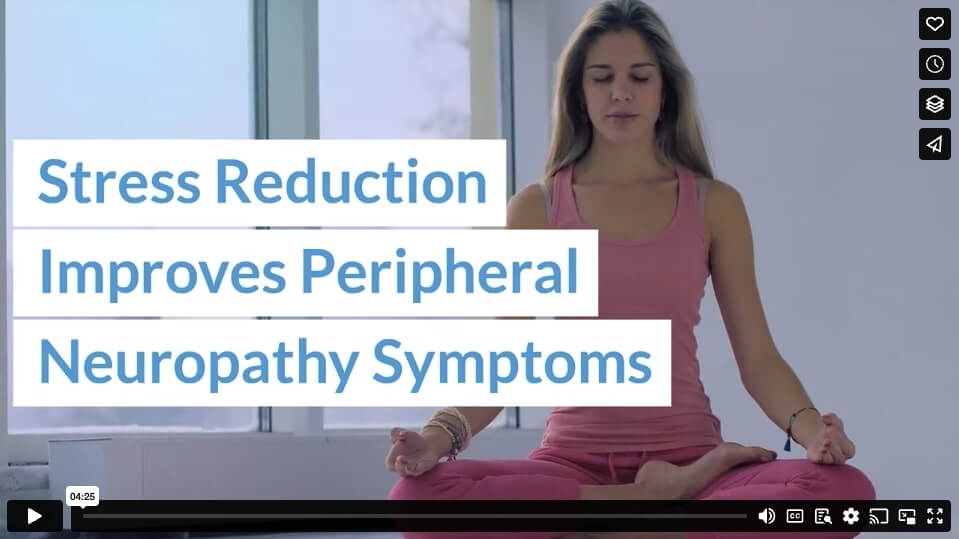As a society, we are inundated with stress. We’re surrounded by messages that tell us we aren’t doing enough. We aren’t skinny enough, rich enough, beautiful enough, smart enough, fast enough, or work hard enough. When we’re at work, we think about what we’re not accomplishing at home. When we’re at home, we feel we’re losing our competitive edge at work. We get too little sleep, over-caffeinated to compensate, eat to fix the energy slump when we crash, and never fully relax. In short, our society is a hot mess.
Some people claim they work better under stress. And while stress may drive us to do and accomplish more, constant stress is detrimental to our overall health. It lowers our immune systems, increases inflammation, makes sleep less effective at restoring our strength and energy, makes it harder to cope with daily difficulties, and increases pain levels.
For people with peripheral neuropathy, this can be a recipe for disaster, but there are ways to mitigate stress and help our bodies return to homeostasis (a neutral, calm state). Stress reduction techniques have proven effective in lowering pain levels and increasing a person’s ability to cope with what remains. Here are some techniques to try to reduce stress and find relief from neuropathy pain.
Yoga
In the beginning, yoga may or may not relieve stress as people may find it difficult to get into the proper poses and focus. However, for those who regularly practice yoga, it can relax tension in the muscles that could compress damaged nerves, increase oxygenation, sharpen focus, and reduce stress.
If you’re new to yoga, start slow. Focus on gentle, slow practices that will help you get limber. Nighttime yoga practices are a good place to start, as they’re meant to calm the body before sleep.
Breathing Exercises
When you’re stressed, the muscles in your face, down the neck, shoulders, and back tighten. Your breathing is shallow, and your posture is curled forward with the head lowered and arms close to the body like you’re trying to protect yourself. You’re in fight or flight mode.
In most cases, you aren’t guarding against a physical danger. It’s an unconscious response to chronic rather than acute stress. The body cannot relax because it’s trying to protect you from some unknown threat.
Posture, breathing patterns, and movement all send signals that have physiological responses. They can raise and lower stress hormones like adrenaline and cortisol. Making a conscious decision to relax your body can trick your body into thinking the danger has passed and you no longer have to be on guard. Deep breathing exercises are one of the quickest ways to accomplish this goal.
Try box breathing. Breathe in deep from the diaphragm for a count of eight, hold your breath for eight, and then release it slowly for a count of eight. Repeat. While you focus on deep breathing, close your eyes, lower your shoulders, lift your head, and let your arms and legs go limp. It won’t be long before you feel your body relax.
Exercise
Repetitive, full-body movements that require deep breaths also lower cortisol levels. One of the more effective exercises is swimming. Swimming requires you to breathe deep and even between strokes while focusing on a steady rhythm of movement. You also get the therapeutic effects of submerging yourself in water, lessening pressure on damaged nerves and receiving instant neuropathy pain relief. (Be careful not to shock your system with dramatic temperature changes, which can aggravate nerve pain.)
Other helpful exercises include walking or riding a bike. Walk or ride fast enough that you breathe deeper than you do at rest but not so fast you start gasping. When possible, exercise outside in the sun for added vitamin D, fresh air, and a change of scenery.
No matter what exercise you choose, ensure you’re wearing comfortable, well-cushioned shoes and check your feet after every exercise session to look for blisters or sore spots. Treat all foot injuries seriously as peripheral neuropathy is often accompanied by slow healing.
Mindfulness Activities
Another tactic is to engage in enjoyable activities that require your full attention. The type of activity will depend on your personality and preference. Some people love gardening, sewing, woodworking, doing puzzles, or reading. It isn’t so much what you do but that you consciously block out distressing thoughts and focus solely on a pleasurable activity for a time.
Last Thoughts
While you live in a stressful environment, you can actively minimize the impact of stress and peripheral neuropathy pain on your life. You’ll sleep deeper, relax more, enjoy daily activities, and find more comfort. You can also talk to your chiropractor for more tips on managing neuropathy symptoms. Sometimes, you can even have nerve damage reversal depending on the source of damage. Remember, early treatment is always the best option for optimal results.
DISCLAIMER: THIS ARTICLE DOES NOT PROVIDE MEDICAL ADVICE
The information, including but not limited to, texts, graphics, images, and other material contained in this article are for informational purposes only. None of the material mentioned is intended to be a substitute for professional medical advice, diagnosis, or treatment. Always seek the advice of your physician or other qualified healthcare provider with any questions you may have regarding a medical condition or treatment and before undertaking a new care regimen. Never disregard professional medical advice or delay in seeking it because of something you have read in this article.
Video

